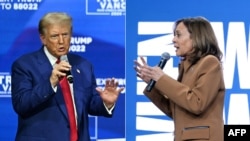U.S. Vice President Kamala Harris and former President Donald Trump are headed into the final full week of campaigning ahead of the November 5 presidential election. Both are looking for any small advantage they can gain to woo the sliver of voters who have not made up their minds in what could be one of the country’s closest votes in decades.
Harris, the Democratic candidate, on Sunday visited Philadelphia, the country’s sixth biggest city and a Democratic stronghold where she needs to pile up her vote count in the political battleground state of Pennsylvania.
It is one of seven tightly contested states both she and Trump, her Republican challenger, have frequently visited and plan to head to in the last days of the campaign for a new four-year term in the White House starting in January.
Harris attended a church service in the morning, while planning to also stop at a barber shop, eat at a Puerto Rican restaurant and visit a youth basketball gym.
Meanwhile, Trump is staging a major rally at Madison Square Garden, self-described as “the world’s most famous arena,” in his native New York City. Poll show Trump has almost no chance of winning the vote in New York state, where he received less than 40% in 2020.
But he wanted to hold a rally at the 19,000-seat arena and some supporters started lining up Saturday morning to get in more than 24 hours later. Hundreds of major political addresses, pop star concerts and basketball and hockey matches have been held there for decades.
“It’s MSG, it's Madison Square Garden," Trump told an interviewer during a recent radio show. "Guys like you and I, that means a lot, those words. Madison Square Garden, right? Don't you think so? ... It's a very big stop."
Harris is planning to make what her campaign is calling its “closing argument” to voters on Tuesday with an address on the Ellipse in Washington, not far from the White House. She is hoping to draw a pronounced contrast with Trump by speaking at the site, the spot where Trump exhorted his supporters on January 6, 2021, to go to the Capitol and “fight like hell” to try to block Congress from certifying that Democrat Joe Biden had defeated him in the 2020 election.
More than 1,500 protesters were arrested in the ensuing riot at the American seat of government and 140 law enforcement personnel injured. The demonstrators caused $2.9 million in property damage to the Capitol as they smashed windows and doors and rampaged through congressional offices.
More than 1,000 rioters have been convicted of an array of offenses, with some of the most serious offenders sentenced to years of imprisonment. Trump says if he wins the election, he might pardon them.
The University of Florida’s Election Lab reports that more than 41 million people have already voted either in person at polling stations or by mail, a number that could prove to be about one-quarter of the total vote. Early voting and mail balloting are continuing throughout much of the country this week.
In 2020, more than 155 million votes were eventually cast, with about one-third of them at polling sites on the official Election Day and the remainder ahead of time or by mail.
Political surveys show the 2024 election is very close, leaving supporters of both candidates able to cherry-pick which surveys to look at if they want to say their candidate is in front. The country’s two most prominent newspapers, The New York Times and The Washington Post, both say Harris narrowly leads in four of the seven battleground states, enough of an edge that would hand her the presidency if she holds on.
But ABC News gives Trump the edge in its analysis, as does the Realclearpolitics.com aggregation of polling.
U.S. presidential elections are not decided by the national popular vote but rather through the Electoral College vote, which turns the election into 50 state-by-state contests, with 48 of the 50 states awarding all their electoral votes to the winner in their states, either Harris or Trump, while Nebraska and Maine allocate theirs by both state and congressional district vote counts.
The number of electoral votes in each state is based on population, so the biggest states hold the most sway in determining the overall national outcome, with the winner needing 270 of the 538 electoral votes to claim the presidency.
Polls show either Harris or Trump hold substantial or somewhat comfortable leads in 43 of the states, enough for each to get to 200 electoral votes. Barring an upset in one of those states, that leaves the outcome to the remaining seven states – a northern tier of three states (Michigan, Pennsylvania and Wisconsin), two states in the Southeast (Georgia and North Carolina) and two in the Southwest (Arizona and Nevada).
Polling in the seven states is easily within the margins of statistical error, leaving the outcome in doubt in all seven.





Forum